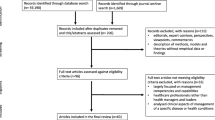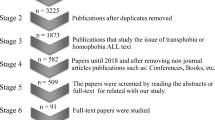Abstract
This paper seeks to establish the ethical foundation of MNCs' responsibility for providing host country workforce (HCW) preparation and training attendant to the new expatriate management assignment. It argues that such moral responsibility arises from a set of correlative duties which MNCs acquire as business institutions. They include duties involving the expatriate manager, the HCW, and the host nation to (1) assist all employees, including the expatriate manager, in the successful execution of their assignments; (2) avoid the semblance of discriminatory treatment; (3) encourage full status integration into a global economy; (4) foster personal enlightenment and self-enrichment; (5) help individuals develop useful, marketable skills; (6) contribute to the development of a greater and more functional national labor skill base; and (7) encourage a long-term focus on creating enduring value for a maximum number of stakeholders, rather than upon short-term and shortsighted profit for only a few. Some important cautions and considerations related to HCW training implementation are then discussed.
Similar content being viewed by others
References
Andrews, K. R.: 1986, ‘Corporate Strategy: The Essential Intangibles’, in Foulkes (ed.),Strategic Human Resources Management: A Guide for Effective Practice (Prentice-Hall, Englewood Cliffs, NJ).
Baird, L., I. Meshoulam, and G. DeGive: 1983, ‘Meshing Human Resource, Planning with Strategic Business Planning: A Model Approach’,Personnel 60, 14–25.
Befus, C. P.: 1988, ‘A Multilevel Treatment Approach for Culture Shock Experienced by Sojourners’,International Journal of Intercultural Relations 12, 381–400.
Beckhard, R.: 1969,Organization Development: Strategies and Models (Addison-Wesley, Reading, MA).
Bennis, W. G.: 1969,Organization Development: Its Nature, Origins, and Prospects (Addison-Wesley, Reading, MA).
Black, J. S. and M. E. Mendenhall: 1990, ‘Cross-cultural Training Effectiveness: A Review and a Theoretical Framework for Future Research’,Academy of Management Review 15, 113–136.
Black, J. S. and M. E. Mendenhall: 1991, ‘A Practical but Theory-Based Framework for Selecting Cross-Cultural Training Methods’, in Mendenhall and Oddou (eds.),Readings and Cases in International Human Resource Management (PWS-Kent Publishing Company, Boston).
Blau, P. M.: 1964,Exchange and Power in Social Life (Wiley, New York).
Donaldson, T.: 1989,The Ethics of International Business (Oxford University Press, New York).
Dowling, P. J. and R. S. Schuller: 1990,International Dimensions of Human Resource Management (PWS-Kent Publishing Company, Boston).
Earley, P. C.: 1987, ‘Intercultural Training for Managers: A Comparison of Documentary and Interpersonal Methods’,Academy of Management Journal 30, 685–698.
Enderwick, P.: 1985,Multinational Business and Labour (St. Martin's Press, New York).
Harris, P. R. and R. T. Moaran: 1987,Managing Cultural Differences (2nd Edition) (Gulf Publishing Co., Houston).
Heenan, D. A. and H. U. Perlmutler: 1979,Multinational Organization Development (Addison-Wesley Publishing Co., Reading, MA).
Huse, E. F. and T. G. Cummings: 1985,Organizational Development and Change (3rd Edition) (West Publishing Co., New York).
Katz, D. and R. L. Kahn: 1978,The Social Psychology of Organizations (Wiley, New York).
Kobrin, S. J.: 1988, ‘Expatriate Reduction and Strategic Control in Multinational Corporations’,Human Resource Management 27(1), 63–75.
Landis, D. and R. Brislin: 1983,Handbook on Intercultural Training (Volume 1) (Pergamon Press, New York).
Lawler, E. E.: 1986,High Involvement Management (Jossey-Bass, San Francisco).
Manzini, A. O. and J. D. Gridley: 1986,Integrating Human Resources and Strategic Business Planning (AMACOM, New York).
McGregor, D.: 1960,The Human Side of Enterprise (McGraw-Hill, New York).
Mendenhall, M. E., E. Dunbar, and G. Oddou: 1978, ‘Expatriate Selection, Training, and Career-Pathing: A Review and Critique’,Human Resource Management 26, 331–345.
Mendenhall, M. E. and G. Oddou: 1986, ‘Acculturation Profiles of Expatriate Managers: Implications for Cross-Cultural Training Programs’,Columbia Journal of World Business 21(4), 73–79.
Oddou, G. R. and M. E. Mendenhall: 1991, ‘Succession Planning for the 21st Century: How Well are we Growing Our Future Business Leaders?’,Business Horizons 34(1), 26–34.
Phatak, A. V.: 1989,International Dimensions of Management (2nd Edition) (PWS-Kent Publishing Co, Boston).
Rogers, C. and R. Farson: 1976,Active Listening (Industrial Relations Center, Chicago).
Sashkin, M.: 1984, ‘Participative Management is an Ethical Imperative’,Organizational Dynamics Spring, 5–22.
St. John, W. D.: 1983, ‘Successful Communications between Supervisors and Employees’,Personnel Journal January, 71–77.
Steiner, G. A. and J. F. Steiner: 1985,Business, Government, and Society (4th edition) (Random House, New York).
Thibaut, J. W. and H. H. Kelley: 1959,The Social Psychology of Groups (Wiley, New York).
Tichy, N. M., C. J. Fombrun, and M. A. Devanna: 1982, ‘Strategic Human Resource Management’,Sloan Management Review 23, 47–61.
Tung, R.: 1981, ‘Selecting and Training of Personnel For Overseas Assignment’,Columbia Journal of World Business 16, 68–78.
Vance, C. M., D. Boje, and H. D. Stage: 1990a, ‘Global Management Education and Development: An Examination of the Cross-Cultural Applicability of Traditional Training Principles’, paper delivered at the National Conference of the Academy of Management, San Francisco.
Vance, C. M., D. Boje, and H. D. Stage, 1990b, ‘An Examination of the Cross-Cultural Transferability of Traditional Training Principles for Optimizing Individual Learning’, paper delivered at the International Conference of the Western Academy of Management, Shizuoka, Japan.
Vance, C. M.: 1991, ‘Preparing the Host Country Workforce for Expatriate Managers: The Neglected Others Side of the Coin’, presented at the Eastern Academy of Management International Conference, Nice, France, June 1991.
Vance, C. M. and J. T. Wholihan: 1992, ‘Preparing the Host Country Workforce for Expatriate Managers: Building a New Research Agenda’,Proceedings of the 3rd Conference on International Personnel and Human Resources Management (Ashridge Management College, Hertfordshire, U.K.), July 2–4.
Velasquez, M., D. J. Moberg, and G. F. Cavanaugh: 1983, ‘Organizational Statesmanship and Dirty Politics: Ethical Guidelines for Organizational Politicians’,Organizational Dynamics Autumn, 65–80.
Wilson, A.: 1978,The Strange Ride of Rudyard Kipling: His Life and Works (Viking Press, New York).
Additional information
Charles M. Vance, associate professor of management at Loyola Marymount University in Los Angeles, has both a domestic and international focus on human resource management and learning system design to enhance organizational performance. He has several publications, and his new book,Mastering Management Education (Sage Publications), is to be published in 1993.
Eduardo S. Paderon is the Associate Dean of the Hagan School of Business of Iona College in New Rochelle, New York. He teaches graduate courses on Business Policy and Business and Society. His writings and other scholarly activities, including presentations at national and international conferences, focus on business ethics and cross-cultural value studies.
Rights and permissions
About this article
Cite this article
Vance, C.M., Paderon, E.S. An ethical argument for host country workforce training and development in the expatriate management assignment. J Bus Ethics 12, 635–641 (1993). https://doi.org/10.1007/BF01845902
Issue Date:
DOI: https://doi.org/10.1007/BF01845902




